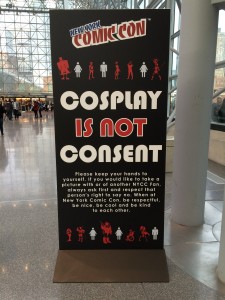
The conspicuous sexual harassment policies at New York and a growing number of other conventions are well worth exploring – we should not let our growing familiarity with the phenomenon obscure how unusual they truly are. Visually engaging sexual harassment policies are not exactly the norm at work or school. What’s more, when have you last seen a policy that didn’t sound in your head like it was being read in the voice of Ben Stein? (Who, by the way, really is a lawyer – a fellow alumnus of Yale Law School.)
The legal aspects of this will follow in a separate post, but for now, I want to focus on how the signs themselves reflect the convention environment — and perhaps those of other contemporary spaces, whether at work, school or non-comics-related mass gatherings.
Marshall McLuhan famously observed that the medium is the message – first we shape our tools and then our tools shape us. Although the best-known examples of this come in the form of electronic technology (TV, smartphones, the Internet), the effects of media can be seen throughout human experience. For example, McLuhan observed back in the 1960s that comics were a “participational” medium — people didn’t just read them; readers also exhibited a striking tendency to want to create and connect.
Cosplay, fan sites, indie comics, comic-cons – these are just a few manifestations of the participatory effects associated with comics and related media such as video games and even film, now that the costs of complex creative expression have been substantially reduced. Not coincidentally, we’ve also seen a significant communal and inclusive dimension to comic-con harassment policies. For example, the breadth of protection exceeds that of federal sexual harassment laws, and ReedPOP didn’t just rely on its lawyers but reached out to The Mary Sue for input into the anti-harassment policy now on display. Whatever the legal benefits of this strategy, it also has the benefit of presenting convention goers with a policy that resonates with their culture, which enhances respect not just for the policy but the convention itself.
One striking expression of this came in my conversations with with The Mary Sue’s Rebecca Pahle and Siobhan Lynch, a member of the panel who helped put together the new policy. Whereas one often encounters a fair bit of disillusionment and cynicism when talking to people who been consulted by management or government in devising policies, Rebecca and Siobhan both expressed satisfaction with a process in which multiple voices were heard. The policy you see at NYCC, in its program and on the web, they noted, reflects most of the panel’s recommendations. Things that were omitted, such as a requirement for attendees to click agreement to the policy when purchasing passes, were left out primarily due to technical and timing issues.
Along with the sense of participation, the policy’s graphic design is an equally important expressions of the convention and and its culture. The size of the display is proportional to the ads that surround it, which in turn reflect the cavernous space and large crowds. The same goes for the use of visually arresting graphic design, a feature that is conspicuously lacking in the typical sexual harassment policy. Repetition is another familiar design strategy – instead of being posted in a single area (workroom, column, registration desk), the sign appears in multiple instances throughout the convention.
As communal connection and the fusion of typeface and image in graphic-oriented communication have leapt from comics to become the lingua franca of literacy today, it may only be a matter of time before we see the style of anti-harassment policies at New York Comic Con and other pop-culture conventions become the norm in other contexts as well.







IMO. It doesn’t feel like there is “ACTION” in that poster/tagline. It doesn’t speak to morons and maniacs in a method of authority. I also wonder if people actually read this with so many things going on.
Since cosplayers wear them big ID cards at conventions, maybe that card could simply say “DO NOT TOUCH COSPLAYER.”
The other side of the sign has the “fine print” of the policy.
The idiots… they’ll glance over it, just as they glanced over the cosplay weapons policy (which they suffered for… the table showing tagged “weapons” would make the Manhattan DA jealous).
It’s meant to be commonplace. It’s meant to become part of the convention experience. There aren’t ReedPOP babushkas policing attendees… it’s stated, it’s warned, and ReedPOP has a stated procedure of dealing with all complaints.
Actually, “Basically, don’t be an idiot.” is part of ReedPOP’s rules.
Comments are closed.